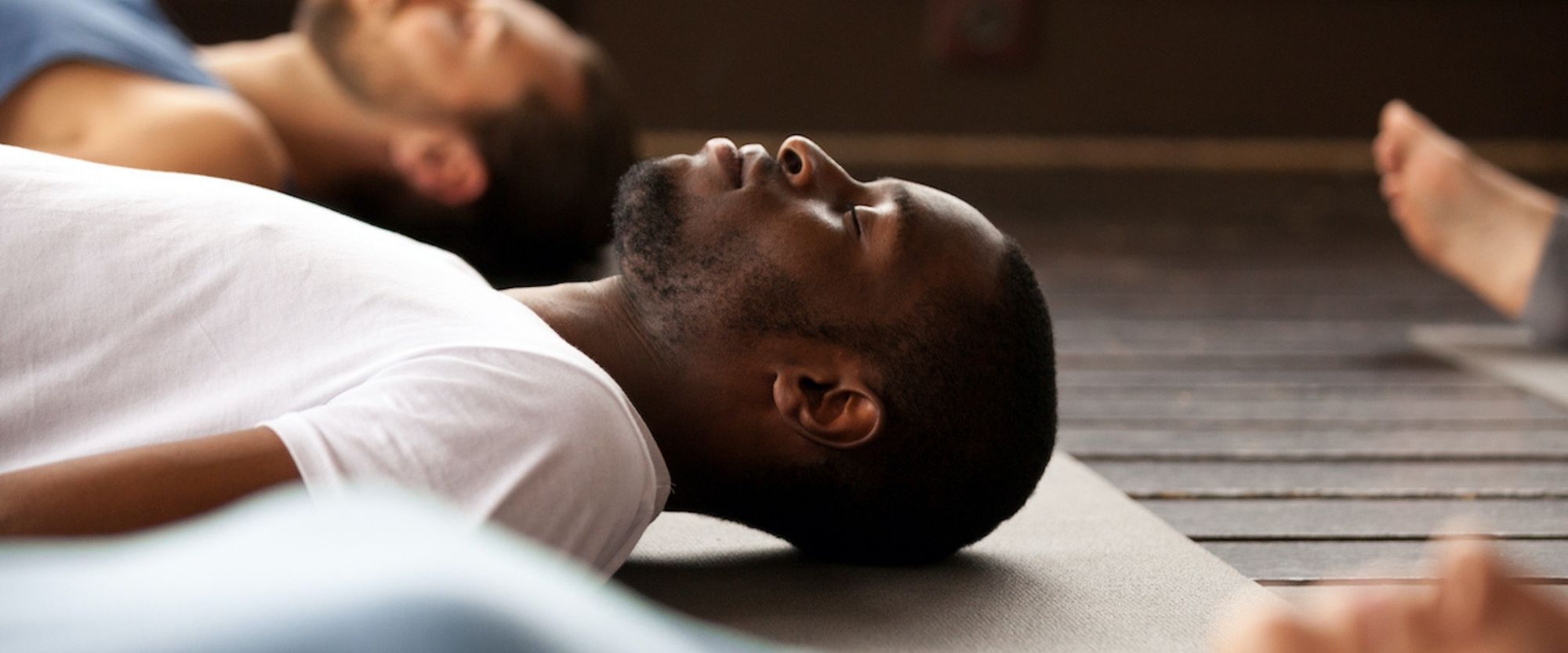Are you finding it hard to focus, or even to string a coherent sentence together? When burnout hits, the secret to de-stress could be found in this ancient yoga practice
Is your brain feeling fried? Have your thoughts checked out – or worse still, are they spinning endlessly, and you can’t turn them off? Maybe you can’t get to sleep, or you’re nodding off in meetings, or waking up in the middle of the night totally wired? If you know, you know; all these unpleasant experiences are signs of burnout, and it can feel like a desperate situation – maybe on a bad day you can even smell the smoke from your over-fired nervous system?
Thankfully there’s a balm that offers the perfect solution to quieten your burnt-out brain: the yoga of sleep. Yes, yoga nidra literally means the ‘sleep of the yogis’. And it’s probably not what you’re expecting…
What is yoga nidra?
When you think of yoga, you might conjure up images of sweaty contortions to improve flexibility – but yoga has so many other important elements and benefits. Yoga nidra is an ancient form of yoga that helps you relax and hover on the threshold of sleep – effectively it’s a meditation on the moment of falling asleep. And it’s the perfect potent balm for your burnt-out brain. Yoga nidra has the effect of reducing stress so you can sleep better, and it can boost your creativity. It’s so simple that you can easily practise at home.
This restful yoga requires no physical movement whatsoever. Instead, you listen, and are skillfully talked into the fringes of sleep. Hovering there, you often drop off. It’s the perfect antidote for burnout: horizontal yoga under your blanket or duvet.
So how does it work? All you do is rest for around 20 minutes, listening to a yoga nidra recording, as your body and mind naturally restore themselves to balance and quiet. You don’t even need to pay any particular attention, just be there and hear the voice. And rest, very deeply.
Where did yoga nidra originate?
This nurturing and healing practice is the fastest-growing form of yoga in the world, and it originates in ancient India. The special state of yoga nidra – the ‘yogic sleep’ – is described in many ancient South Asian epic poems. Yoga Nidra Shakti herself even shows up as a super-powerful goddess in an ancient hymn to the triumph of the Great Divine Mother – she sends Vishnu, the sustainer of the known universe, into such a deep sleep that no one else can wake him up. Yes, yoga nidra is that powerful.
How does yoga nidra work?
The truly wonderful thing about yoga nidra is that pretty much anyone can do it – it’s completely accessible. Anyone who has ever fallen asleep can practice yoga nidra because it is a conscious meditation upon the very natural process of falling asleep. All you need to do is to lie down and listen; notice what happens and be with just that. The more you practise yoga nidra, the more easily you can cultivate the capacity to drop off anytime you need. And when you wake up – bingo! The burnt-out brain feels restored, even if you have only been resting for 20 minutes.
How does the magic happen? Neurologically speaking, what is actually going on inside your head during yoga nidra is a gradual settling of electrical activity in the brain. As you rest, your brain waves cycle down from high-stress top levels of beta (extreme anxiety), through restful reveries of alpha waves, and down into dreamy states of theta waves, until you may, quite likely, come to rest for a while in delta waves of deepest sleep, where vital repair and restoration happens.
It will take you about 15 or 20 minutes a day to practise, and you don’t need to move a muscle to do it. This is one of the most accessible, simple, and effective of all yoga practices. All you need is a space to lie down and listen. That’s it.

Try yoga nidra for yourself
It couldn’t be easier. There are three simple steps to taste yoga nidra at home or work right now:
1. Build your ‘nidra nest’ and settle in
2. Choose your recording
3. Lie down, listen, and rest
Build your nidra nest
It’s worth taking time to get settled. You’ll get better quality rest if you make a comfortable nest in which to practise yoga nidra. The minimal equipment required is a mat or rug (or sofa or bed), a pillow, and enough covers to keep warm, because body temperature tends to drop rapidly during practice. And that’s it. If your intention is to fall asleep, then the best place to practise is in your bed, because if you do drop off you can continue to sleep soundly.
Choose your recording carefully
This is where you need to get a bit picky. There are thousands of ‘yoga nidra’ recordings on the world wide web of wonders and terrors. A lot of them are random folk reading scripts they found in a yoga book – sometimes you can hear them turning the pages – and others may sound stressed themselves.
And then – here’s a paradox – even if you have found a recording with a voice you like, and it feels relaxing, some yoga nidra recordings conclude with a cheerful announcement telling you it’s time to rise and shine. Clearly, this is not what you want in the wee small hours when you have finally got your frazzled brain to let you drop off.
If you want yoga nidra to help you get to sleep and stay asleep, it’s vital to choose a recording that is not going to wake you up at the end. So pick one specially for the purposes of helping you sleep – like the ones by the ex-insomniac hypnotherapist Nirlipta Tuli, co-founder of the Yoga Nidra Network. Nirlipta’s deep bass-baritone voice and soporific nidra style have led him to be known as ‘The Barry White of yoga nidra’.
On the other hand – if you want a 20-minute antidote to the afternoon slump, then choose a nidra that’s designed to boost your creativity, and help you awaken full of bright ideas, raring to go. Thankfully, many top-quality yoga nidra recordings, specially designed for these very different purposes, are in my book, Yoga Nidrā Made Easy.
So, why not give yoga nidra a go for yourself? Settle in for some sound slumber, and give your burnt-out brain a rest.

You can purchase Yoga Nidrā Made Easy: Deep Relaxation Practices to Improve Sleep, Relieve Stress and Boost Energy and Creativity by Uma Dinsmore-Tuli and Nirlipta Tuli now for £10.99.
To connect with a life coach or to find out more about the benefits of yoga, visit Life Coach Directory.


Comments